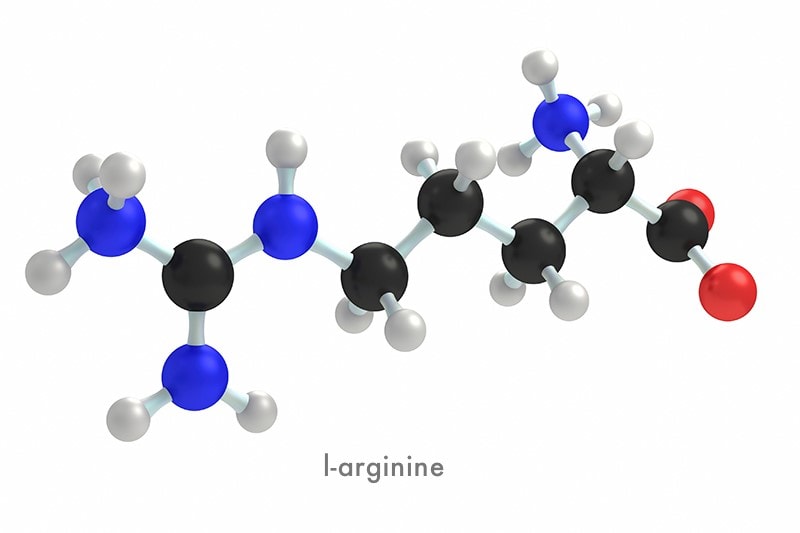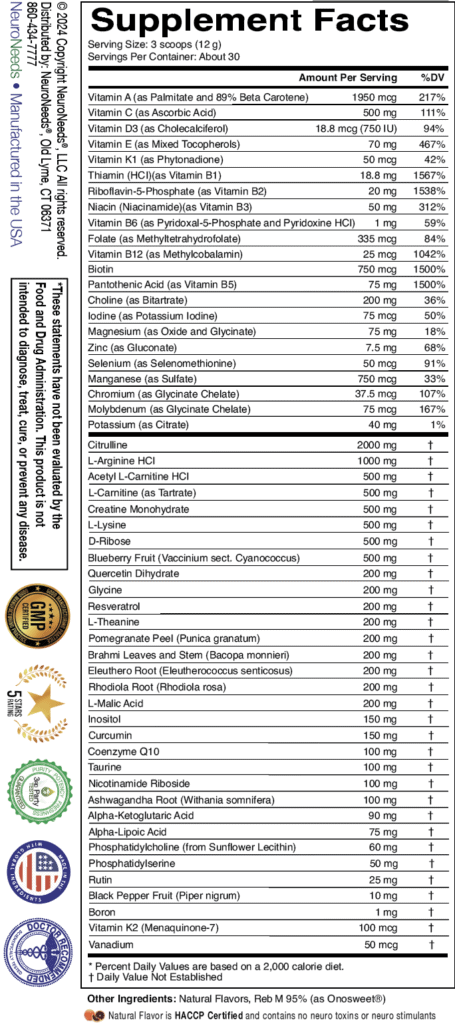$84
Arginine
Arginine, one of the amino acids that comprise all proteins, can be made by our bodies but not in sufficient quantities for all situations. In addition, arginine has important functions in cell division, growth, wound healing, ammonia excretion, immune function, and hormone release. Arginine deficiency is rare outside of specific situations such as in preterm infants, bowel or kidney disease, and specific genetic disorders. Arginine is required for the synthesis of nitric oxide, which helps blood vessels relax, and therefore dilate, allowing for increased blood flow. Thus, arginine is often given as a supplement in order to improve circulation in certain health conditions related to restricted circulation, such as high blood pressure, angina, and peripheral arterial disease. Studies have shown that arginine can help prevent and treat stroke, stroke-like episodes, and migraine in MELAS, an inherited mitochondrial disorder. Thus, arginine is often recommended for cardiovascular health. Arginine is generally recognized as safe at intakes of up to 20 grams per day, and L-lysine is provided as well in ActivNeeds to reduce the likelihood of herpes outbreaks.
Arginine in ActivNeeds

Arginine is added in order to provide a wide basis of nutrition and for cardiovascular health, especially given the important role of arginine in the vasculature. Per Dr. Boles’ experience, arginine supplementation has been found to reduce episodes of pain, dizziness, and/or irritability, and that arginine dosages at least up to 10 grams a day are well tolerated. Side effects are unexpected with the moderate dose of arginine (1,000 mg in adults) used in ActivNeeds.
Of note, 2,000 mg of L-citrulline is also present in ActivNeeds®. Arginine and citrulline are similar amino acids that our bodies rapidly inter-converted between the two. Many metabolic physicians consider citrulline to be more effective than arginine, thus 2/3 of the total is provided as citrulline in ActivNeeds
Arginine is a conditionally essential amino acid in that it can be made by our bodies but not in sufficient quantities for all situations.
Arginine is one of the 20 plus amino acids that comprise all proteins. In addition, arginine has important functions in cell division, growth, wound healing, ammonia excretion, immune function, and hormone release. Arginine is also required for the synthesis of nitric oxide (NO) and creatine.
Since our bodies can synthesize arginine and it is present in almost all dietary proteins, arginine deficiency is rare outside of specific situations such as in preterm infants, bowel or kidney disease, and specific genetic disorders.
Nitric oxide is a neurotransmitter that helps blood vessels relax, and therefore dilate, allowing for increased blood flow. As arginine increases nitric oxide production, it is thus often given as a supplement in order to improve circulation in certain health conditions related to restricted circulation, such as high blood pressure, angina, peripheral arterial disease, and other cardiovascular conditions. Several studies have shown that arginine can help prevent and treat stroke, stroke-like episodes, and migraine in MELAS, an inherited mitochondrial disorder (https://www.ncbi.nlm.nih.gov/pmc/articles/PMC5519148/pdf/nihms876713.pdf). However, there is little data regarding the effects of arginine on migraine in general. Arginine is also frequently used to boost athletic performance, especially with alpha-ketoglutarate.
Arginine is generally recognized as safe (GRAS-status) at intakes of up to 20 grams per day (https://www.ncbi.nlm.nih.gov/pubmed/18325648). In Dr. Boles’ experience, arginine in dosages at least up to 10 grams a day is well tolerated for many years.
Some health providers consider high-dose arginine to be a risk factor for herpes (HSV) virus reactivation. Arginine and lysine (an essential amino acid) compete for the same transporters, and thus high-dose arginine can cause lysine deficiency. Lysine is often used in the treatment of herpes. For this reason, lysine is included as well in ActivNeeds.
Laboratory testing can reveal the presence of a deficiency of this nutrient, but is generally not likely to have clinically utility.
How and Why is L-Arginine Used in ActivNeeds
Arginine is added to ActivNeeds for its important role of arginine in the vasculature, for optimized cardiovascular health. As alpha-ketoglutarate is also present in ActivNeeds, arginine may also assist in boosting qualities such as muscle strength and endurance. In addition, Dr. Boles has observed that arginine supplementation can reduce episodes of pain, dizziness, and/or irritability. Side effects are unexpected with the moderate dose of arginine (1,000 mg in adults) used in ActivNeeds, and L-lysine is provided as well to reduce the likelihood of herpes outbreaks..
Order ActivNeeds Today
Formulations










